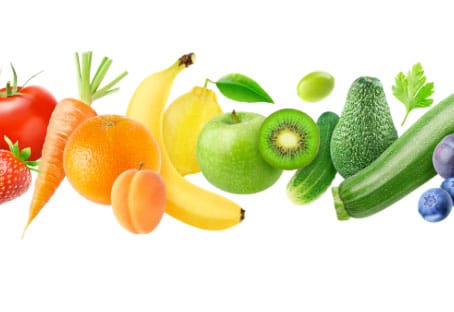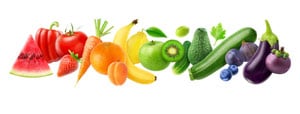
Last week, I told you the #1 guidance I give to my private clients – to eat more vegetables and fruits, and to eat a wide variety of different types of them. You can read more about that by clicking here.
Today I want to dive a little deeper into the importance of eating a varied diet, and what nutrients different colors of plant foods contain and how they help our bodies to function the way that they should. I love how nature color codes foods to give us a clue as to the nutrients inside! Plus, a beautiful colorful plate is much more appealing to our senses than a plate with all one color – a way that our bodies were created to naturally be drawn to a variety of foods to help promote our own health and self-healing.

RED
Red foods include: Red bell peppers, strawberries, raspberries, watermelon, tomatoes, red grapes, red onion, cherries, red apples, beets
Key nutrients: Lycopene – a phytonutrient* that helps to repair damage to DNA and therefore prevent some cancers as well as protects heart and lung function, Vitamin C and Vitamin A, which are powerful antioxidants
ORANGE/YELLOW
Orange/Yellow foods include: Carrots, sweet potatoes, orange/yellow bell peppers, peaches, apricots, yellow squash, bananas, papaya, oranges, tangerines, mango, cantaloupe, corn
Key nutrients: Vitamin C, Vitamin A, Beta carotene help to repair cells and improve cellular communication; potassium – helps to promote muscular control, nerve function, and fluid balance in the body
GREEN
Green foods include: lettuce, kale, chard, peas, green beans, asparagus, broccoli, spinach, avocados, kiwi, green tea, herbs
Key nutrients: You’ve always been told to eat your greens, and for good reason – they have the highest fiber and antioxidant content than any other color in our food rainbow! These are rich in cancer-blocking chemicals including sulforaphane, isocyanate, and indoles that help to stop the action of cancer-causing chemicals called carcinogens. Additionally, they are rich in potassium and Vitamin K, which helps to keep your blood clotting as it should.
BLUE/PURPLE
Blue/Indigo foods include: cranberries, purple/black grapes, eggplant, blueberries, blackberries, plums, figs, purple cabbage
Key nutrients: Powerful antioxidants called anthocyanins that help to delay cellular aging which leads to the promotion of more healthy aging processes, protection from cancer, blocking the formation of blood clots which reduces risk of heart attack + stroke, boost memory function and urinary tract health
WHITE/BROWN
White/Brown foods include: onions, cauliflower, garlic, leeks, parsnips, daikon radish, mushrooms, ginger, turnips, potatoes, onions
Key nutrients: potassium, fiber, beta-glucans which help to boost heart health, immune function, and improve blood sugar control; and antioxidants lignans, EGCG, and the onion family contains allicin.
I listed most common color varieties of foods, but many foods come in many colors! Have you tried purple or golden cauliflower? How about a purple sweet potato or yellow raspberries? The next time you’re at the grocery store, I challenge you to find a uniquely colored vegetable or fruit and give it a try!
How does your plate look? Do you find yourself eating the same foods over and over again, or do you make it a point to get a variety of nutrients? We tend to be creatures of habit, so it is completely normal to eat the same things out of routine if we don’t prioritize including a variety of foods in our diet. Not sure where you stand? Download the free Eat the Rainbow Tracker below and find out! This activity is fun for all ages to participate in and a great way to bring the family together toward the goal of better health.


